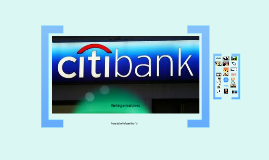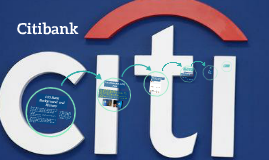Citibank
Transcript: Banking on bad press Presented by Professor Brian To “Too big to fail” is the standard rationale for federal bailouts of banks, automakers, and insurance companies. Citigroup (C) may have been too big to succeed in a rapidly changing business environment Once upon a time, long before the Troubled Asset Relief Program was invented, Citigroup turned itself into a megabank that posted billions in earnings each quarter Mortgage-backed securities punched a hole in the business model, and top managers were slow to recognize the risk The bank’s varied operations and what some called its “Balkanized” management made it difficult to take corrective action quickly All the bank lacked were adequate controls, accountability, and the right people atop a vigorous corporate culture As the company fell apart, many mistook lack of smarts for mendacity Nevertheless, the company made sense when Sandy Weill merged Travelers Group with Citicorp in 1998 to create what was ballyhooed as a “financial supermarket.” In retrospect, it just looks stupid, greedy, and a trifle evil In June, Citigroup lost the status of being of a component of the key 30-stock Dow Jones Industrial Average “Being removed from the index has no impact on the company strategy nor our efforts to return Citi to sustained profitability,” says Alex Samuelson, spokesman for Citigroup On the way down, Citigroup pumped out big, billowy clouds of optimism and sometimes acted as if it weren’t challenged by changing circumstances Last January, with its stock trading at about $3.67 a share, Citigroup spent $50 million on a new private jet after taking $45 billion in taxpayer funds to stay alive Citigroup’s decision to buy the new jet may not be the catastrophe it appeared to be because the company ordered the plane two years ago when it was flush Citigroup apparently forgot, that when you’re kept alive with taxpayers money, it’s smart to buy a coach ticket on a commercial flight to at least create the image of frugality A day after the story broke, Citigroup canceled the order “Citi continually explores ways to reduce all its assets, including aircraft," Michael J. Hanretta, a company spokesman, said in a prepared statement "Citi is exploring all its options for these assets, including the potential sale or lease of the aircraft. It is important to note that TARP funds will not be used for these purchases." Andrew Hall is in line to get a $100 million bonus the phenomenally successful energy trader at Phibro, a unit of Citi Hall's contract entitles him to a $100 million bonus He is the Solomonic attorney who administered the 9/11 Victim Compensation Fund and is now the Obama administration's Wall Street pay czar Feinberg will have to consider whether it is proper for an institution that, without substantial taxpayer support, couldn't pay $100 bonuses to pay a $100 million one Should Hall not get paid as he sees fit, he could simply retire or take his band of traders elsewhere thus depriving Citi—and its shareholders—of the profits he could create Citi CEO Vikram Pandit, of all people, should know that committing huge sums of shareholders' capital to retain the services of a hot trader doesn't always pay off In the spring of 2007, Citi spent close to $800 million to acquire the hedge fund Old Lane Essentially, Citi was paying for the privilege of employing its founders, who had racked up impressive results A year later, after the fund suffered losses, Citi basically folded it another public relations disaster But given the compensation dynamics of the industry, it's unlikely shareholders would see a lot of those gains were he to stay This puts Citigroup in the tough position of rewarding a star or incurring the wrath of taxpayers because it received public money to stay afloat In what may be the final kick down the stairs, Travelers Companies (TRV) replaced it on the index Shareholders are paying an awful lot for the services of smart traders at these publicly owned hedge funds But in order to make good on the deal, Citi, which is now hugely supported and partially owned by taxpayers, must get the blessing of Kenneth Feinberg

















